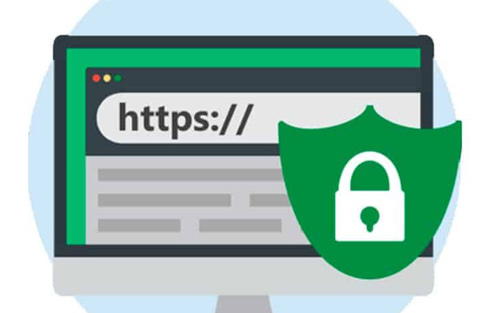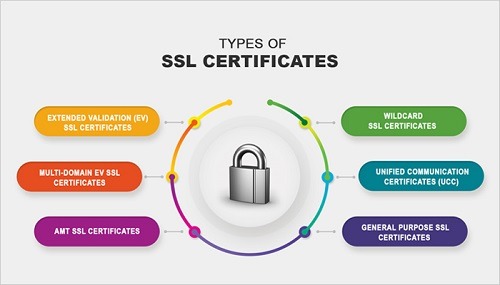
What are SSL certificates?
An SSL certificate is a type of certificate that states the official approval of a website and still supports encrypted connections. This SSL certificate assures the client that the website has full ownership of the domain issued by the authority.
SSL in full means secure sockets layer which means a certification providing secure connections over the internet. This connection is usually between the user and the website they are visiting. SSL also intercepts transmission of data over it, which is a key benefit of it.
An SSL certificate contains various aspects. These aspects are:
• Device or person the certificate was issued to
• Domain name the certificate contains
• The authority that issued the certificate
• Subdomains
• Date issued
• Expiration date
• Authority’s signature
There usually are public and private keys that are used to encrypt and decrypt data with SSL certificates. These keys are usually kept secret and in this case, if a public key is used, only a private key can decrypt the data and the vice versa is true.
How does an SSL certificate work?
SSL certification is very important to your website. This certificate will affirm the users that your website is not only secure but will also ensure no attacks can happen to users in your website due to the encryption offered.
This can even be more vital when users are required to put their personal information such as identification numbers, account numbers and even confidential pins.
 The fact that your website will show the availability of this certificate will help build trust and confidence between the users and the website.
The fact that your website will show the availability of this certificate will help build trust and confidence between the users and the website.
Many would ask how you would know if you are using an SSL certified website. The answer is simple. When you visit a website, at the URL column you will witness an icon resembling a closed padlock just before the URL. This is usually the first signal.
The second signal which is also common is the use of “https://” at the beginning of the URL. It is important to note that there is a difference between “http://” and “https://”.
The one with an “s” is the legit and secure form of the one without.
As a website owner, there is a process to follow in ordering an SSL certificate. First you will need to submit correct details for your server through a CSR, certificate signing request.
You will need to generate this on the server and submit it to the Certificate Authority. The authority will certify your domain and company and issue you with a signed certification, which you can install and use.
There are three types of SSL certificates. These are:
• Organizationally validated (OV) – It extends validation of the website, physical location and domain name.
• Domain validated (DV) – Only verify the owner of the site.
• Extended validation (EV) – This is a recommended certificate for websites handling sensitive information and clients.
Websites need an SSL certificate for three main reasons. Authentication, HTTPS and Encryption.
SSL certificates are obtained from a certificate authority. Also known as CA, these organizations act independently as third parties by generating, signing and giving the certificates to the applied websites.
Signatures from the certificate authority are signed digitally by private keys which are kept secret by them. Fees can be charged but not all authorities will charge fee as there are free certifications offered.
Difference between Paid & Free SSL certificates
Price
The first notable difference between these two certificates is the fact that the free SSL comes free of charge while the paid SSL involves a price to it.
Lifespan
A free SSL certificate can be very essential for you as a new owner of your website because that can be cost-effective. But there is a catch. This certification can only last for a maximum of 90 days.
This means after every 90 days which is equivalent to 3 months, you will have to renew your certificate.
On the other hand, the paid SSL certificate comes with a maximum of 2 years. This means you will wait for two years to reissue your certificate, which is an appropriate time for a website owner.
Validation
Validation is a key factor when applying for an SSL certificate. With the free certification, less information is required as less validation will be done. Actually only the name of the owner in many cases is required.
On the other hand with paid SSL certificate, not only the name is required and verified but also the organization or business itself is verified in depth before issuing of the certificate. All these is done by the certificate authority.
Reliability
This is quite obvious, a free certificate used in a website will not give customers visiting the site confidence as the one that is paid. This is because clients want to feel safe and assured that their details are secure.
Certificate choices
The free certificate only comes with one option of the domain authentication. This means displaying your name or organization’s name on the green bar will not be possible.
As opposed to free certification, paid certification is offered both domain and extended authentication options. This means your organization will be scrutinized for security before allowing your name appear on the green bar.
Warranty
Paid SSL certificates offer credible warranty in case something goes wrong on the certificate authority’s side. Although this has almost never happened, with free SSL certificates this is not an option.
Pros & Cons of an SSL certificate
Advantages
Security and protection
With SSL certification, you are sure to protect the website from attacks and this essentially assures customers visiting your website that it is safe for them to use.
This surety is accomplished by encryption of data only offered by the SSL certification.
Trust and reliability
When visitors visit a site that is well certified and encrypted, they will usually develop trust with the website itself. This makes the website more reliable than those that are not SSL certified. Clients have to get trust in order to fill in those credit card numbers and identifications and this can only happen if they trust the site.
Search Engine Optimization SEO
Due to recently made statements by Google, they indicated that having an SSL certified website could increase the SEO of the website itself.
This means having your website SSL certificate will be beneficial to you as the owner as this will mean it will reach more customers thereby promoting your products or services.
Payments
Today, many websites are required to have SSL certificates in order to fulfil payments. Without this certificate, online payments could fail.
Disadvantages
Cost
Setting up an SSL certificate, from applying and installing, can be quite costly. These costs also come with maintenance required. Yes, there are free SSL certificated offered but are not reliable as the paid ones.
Costs vary depending on the type of certificate you apply and the authority giving the certificate.
Expiry
The SSL certificates are offered only last for two years. This can be substantial time for you to work with your website well but expiration is always due after 2 years.
It would be exciting if these certificates were offered once and lasted a lifetime of the website, right?
Slow performance
A website that has SSL certificates tend to slow down the website as the data has to be encrypted before use. This happens mostly to websites that have SSL certificates and host many visitors.


